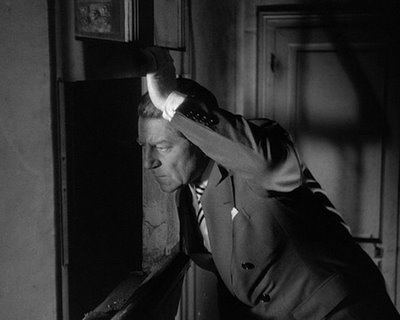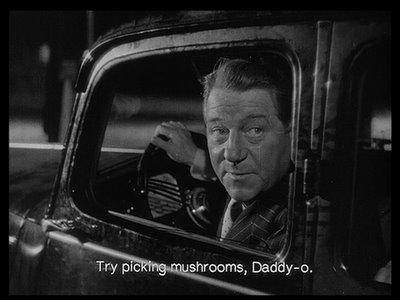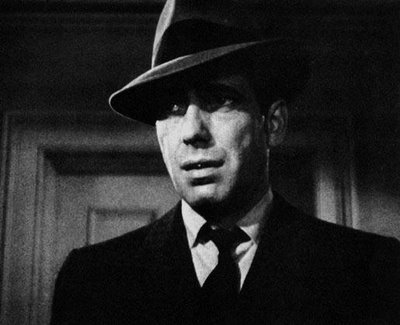
I was well into the adulthood of my movie-life when I found out how much the French--and isn't that insulting? "The French." I know how I feel--mad, that's how--when an American does something particularly ugly, and foreigners get to disdainfully frown, "Americans." Oh, well/C'est la vie. Anyway, there I was in my thirties somewhere when I realized how much the French love--loved?--American movies, especially crime pictures. I'm glad I found out so late: Not only can I still enjoy with young eyes the sight of a French film rolling around in the noir mud--and there they go again, reminding us that we wouldn't be able even to name the darn things without them--re-imagining the genre and showing me things about American crime movies I otherwise might not have paid much attention to, such as the abundance of older--or older-looking--actors as tough-guy leading men, whether as crooks or dicks--and the level of professionalism required of such figures, once you rise above the snarling Scarface/Mike Hammer levels of crime evolution. Of course, the great self-reflexive bridge figure here is Eddie Constantine, whose private eye Lemmy Caution moved through a surreal Franco-American universe with its own timewarp, tossing him at last into the whatsis-future of Jean-Luc Godard's Alphaville (1965).
 But the real treat for me is in the earlier, less self-conscious French noirs--and the man to watch, Jean Gabin. I finally saw Touchez pas au grisbi/Don't Touch the Loot (1954), directed by Jacques Becker, a precise experiment in cross-pollination, and the result is a new bloom whose gunpowder bouquet and blue steel petals knocked me out in too-cool slo-mo. I've read reviews that compare Becker's approach to John Huston's, and that makes sense. Grisbi felt like The Treasure of the Sierra Madre and The Maltese Falcon in its brutally human attention to failure, while ironically praising the virtues of friendship and loyalty. Gabin's Max, a ready-to-retire criminal, is forced to risk everything to save his longtime friend/partner in crime, whose urge to impress a showgirl makes him slip info about a stash of gold bars they'd heisted, Max's pension fund. The resultant kidnappings, beatings/torturings, and general mayhem, while exciting in themselves, are played out with a casual hipness that seems weirdly American--but particularly French. Let's not forget how assuredly they understood jazz, and this movie shows that sensibility, giving us a world in which, as the grin-inducing Criterion Collection subtitles inform us, old French guys call people "Daddy-o," and there was a lot more honest cursing in French cinema's underworld than its American counterpart, despite the latter's ruthless sadism of the migraine-driven Cody Jarrett (White Heat/1949) or the gleeful bullying of Mickey Spillane (Kiss Me Deadly/1955).
But the real treat for me is in the earlier, less self-conscious French noirs--and the man to watch, Jean Gabin. I finally saw Touchez pas au grisbi/Don't Touch the Loot (1954), directed by Jacques Becker, a precise experiment in cross-pollination, and the result is a new bloom whose gunpowder bouquet and blue steel petals knocked me out in too-cool slo-mo. I've read reviews that compare Becker's approach to John Huston's, and that makes sense. Grisbi felt like The Treasure of the Sierra Madre and The Maltese Falcon in its brutally human attention to failure, while ironically praising the virtues of friendship and loyalty. Gabin's Max, a ready-to-retire criminal, is forced to risk everything to save his longtime friend/partner in crime, whose urge to impress a showgirl makes him slip info about a stash of gold bars they'd heisted, Max's pension fund. The resultant kidnappings, beatings/torturings, and general mayhem, while exciting in themselves, are played out with a casual hipness that seems weirdly American--but particularly French. Let's not forget how assuredly they understood jazz, and this movie shows that sensibility, giving us a world in which, as the grin-inducing Criterion Collection subtitles inform us, old French guys call people "Daddy-o," and there was a lot more honest cursing in French cinema's underworld than its American counterpart, despite the latter's ruthless sadism of the migraine-driven Cody Jarrett (White Heat/1949) or the gleeful bullying of Mickey Spillane (Kiss Me Deadly/1955). Still, thinking of those pictures alongside Grisbi gives the French film a special glow. It seems for about a decade American and French cinema maintained an unspoken partnership in the attempt to confront the crime genre with its own darkly beating heart. The opening scene of Grisbi, in which the gamblers and crooks hang out in "their" restaurant--a party of outsiders is summarily sent across the street--shows us Max's gracious cool hard at work, keeping everyone happy, maintaining appearances, biding his time until the gold's cold enough to fence. His unflagging code-loyalty to his foolish friend is, of course, itself foolish, but to play it any other way would dismantle the point of all that cool: Not simply to gather the loot, but to hold it off, a means to a fuller end. When other crooks want it for themselves, the code kicks in again: How could they touch it when Max himself won't? As I mentioned a few days ago, I watched Goodfellas, and Grisbi reminded me of the scene in Scorsese's film in which an ever-angrier Jimmy (Robert De Niro) has to scold his heist gang for buying flashy goods, for touching the loot. Max knows it is paid for in bloody loss. Not a pink Caddy or silver fox coat, le grisbi is the Mexican mountain of greed that overmastered Bogart and company, as well as the black bird, the "stuff that dreams are made of," in Huston's films. Again, Becker's movie knows the value of loot, and the price paid for loyalty. In the end, those gold bars are nothing to Max beside his friend. As Sam Spade says, "Don't be too sure I'm as crooked as I'm supposed to be." Fifteen years later--and an ocean away--Max tenders the same warning, and woe to any mug who gives it the drift.

No comments:
Post a Comment